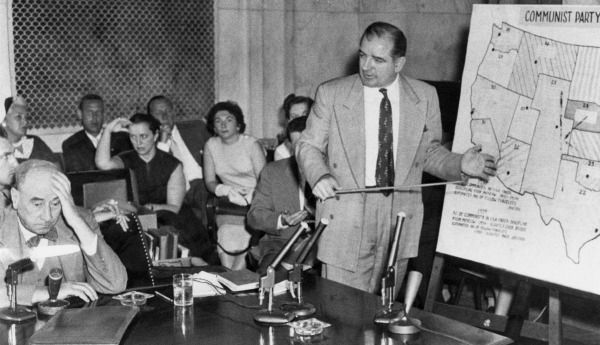Authors:
Historic Era: Era 9: Postwar United States (1945 to early 1970s)
Historic Theme:
Subject:
July/August 2020 | Volume 65, Issue 4


Authors:
Historic Era: Era 9: Postwar United States (1945 to early 1970s)
Historic Theme:
Subject:
July/August 2020 | Volume 65, Issue 4
Editor's Note: Historian Larry Tye has just written a definitive biography of the controversial Red-hunting Senator, Joe McCarthy, Demagogue: The Life and Long Shadow of Senator Joe McCarthy. We asked him to give us a preview of some of the fascinating material he found in previously inaccessible files.

It would be easy to assume there is nothing new to say about Senator Joe McCarthy more than 60 years after his death, and with a library of books documenting his life and movement. Easy, but untrue.
That’s because, for the first time, we have access to the stash of Joe’s personal and professional papers that his widow donated in 1961 to his alma mater, Marquette University, and that were made available exclusively to this author. Now, finally, we can read his unscripted writings and correspondence, military records and wartime medical charts, love letters, financial files, and even his academic transcripts.
And there is more. Only a third of the hearings where McCarthy badgered witnesses in his search for fantastical conspiracies happened in public session. Evidence of the rest, filling almost 9,000 pages of transcripts, was kept under lock and key for half a century.
These seminal documents give us a new and nuanced appreciation of “Low Blow” Joe, one of the most reviled figures in U.S. history. It’s not often that a man’s name becomes an “ism” – in this case, a synonym for reckless accusation, guilt by association, fear-mongering, and political double-dealing. In the early 1950s, the senator from Wisconsin promised America a holy war against a Communist “conspiracy so immense and an infamy so black as to dwarf any previous such venture in the history of man.”
While the conspiracy and infamy claims were a stretch, the body count was measurable: a TV broadcaster, a government engineer, current and former U.S. senators, and incalculable others who committed suicide to escape McCarthy and his warriors; hundreds more whose careers and reputations he crushed; and the hundreds of thousands he browbeat into a tongue-tied silence. His targets all learned the futility of taking on a tyrant who recognized no restraints and would do anything – anything – to win.
“To those of you who say that you do not like the rough tactics – any farm boy can tell you that there is no dainty way of clubbing the fangs off a rattler or killing a skunk . . . It has been a bare-knuckle job.